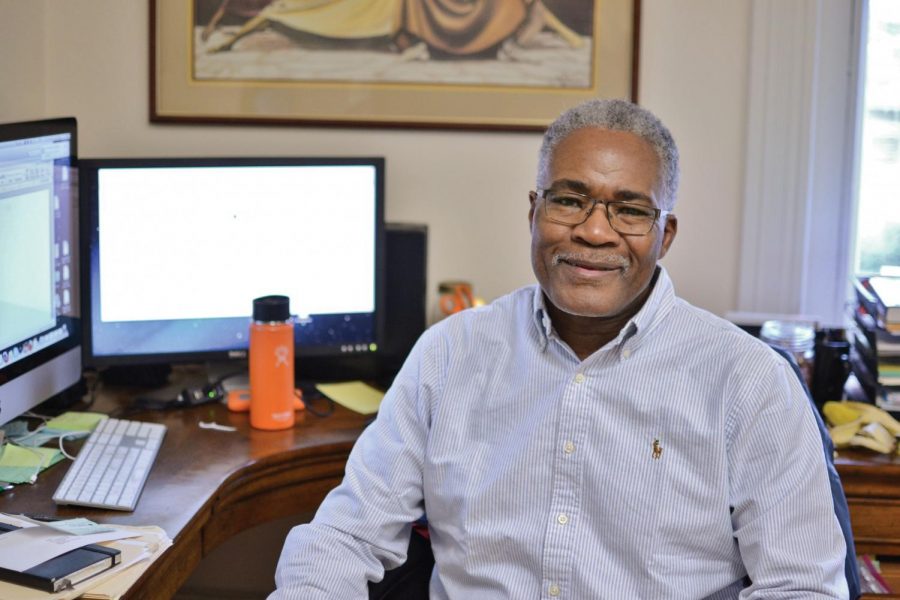Social Justice minor ‘a natural fit’
January 6, 2016
The rise in student interest in social issues on campus in recent years has led to the creation of the social justice minor at Oregon State University.
The program is designed to deepen a student’s area of study with a critical social justice lens, according to the official OSU social justice minor webpage. The minor has only been in existence for one year.
According to the Social Justice minor OSU web page, The social justice minor provides academic classes in which students think critically about social justice and learning activities in which students engage in the work of social justice. The program is meant to address local, national and international issues of social justice
Larry Roper, an OSU professor in ethnic studies was one of the faculty members that helped bring this program to life.
The social justice minor arose from a need for students on campus to have a way to apply critical world thinking to real world scenarios, Roper said. The minor was a natural fit for OSU, according to Roper, because of the rising social activism seen on campus.
“Social justice is an approach to the world that ensures fair and equitable treatment of people and that people share the same advantages in the world of others and that by circumstance of birth, life condition, or any other condition like this, they are not disadvantaged in any way,” Roper said.
The main goal of the social justice minor, according to Roper, is to allow students to add a different perspective to the way in which they view the world.
“The minor adds another frame as to how they will see their major,” Roper said. “Once you learn something, the question then becomes ‘how do you apply that knowledge?’ and the minor really gives someone an entirely new perspective in which to see the world and apply this knowledge.”
Roper highlighted the importance he sees of being able to treat people with respect, and being able to appeal to and respond to the needs of the broad range of individuals that one will encounter in their professional lives as well.
“I have a student in his last few years before medical school who grew up on a farm in a small community, and he came to me asking for mentorship so that he would be able to provide the best care to all of his patients, even though he grew up with little exposure to different demographics,” Roper said. “You can’t control who you treat, but you can control how you treat them.”
In a time when many universities across the country are experiencing turmoil over racial issues and a disconnect between students and administration, Roper praised OSU for its response to these issues, the social justice minor being a part of that.
Last term, students on campus called for discussions with the administration over the treatment of students of color on campus and The Speak Out event was subsequently held. The classes offered under the minor are meant to address similar issues and create more discussion about these topics.
“With the social justice minor we are taking the practical applications of a student’s major and adding a real world filter,” Roper said. “And the filter that adds realities of the world that maybe one wouldn’t get otherwise.”
While Roper helped with the program development, he says other faculty members were even more instrumental in the seeing the minor come to life. Beginning five years ago, the process to bring the social justice minor to fruition began with several faculty members coming up with the idea and then setting on the path to bring it into existence.
“Nancy Rosenberger was the person that did the primary design, and she began that several years ago. She had to get it approved and develop the curriculum, so she did a lot of the leg work,” Roper said. “I think the idea started percolating as more social justice movements arose on campus.”
Shara Howard, a junior majoring in history with minors in women gender and sexualities and social justice was drawn to the social justice program last spring.
“I was already doing the women studies minor and they are pretty similar along with history,” Howard said. “So I thought it would give me a more in depth look into humanities and how to make some type of change.”
Howard was excited for the opportunity to add value to her academic endeavors through the social justice minor. She saw the potential that the minor offered, and decided that the program would aid her major area of focus greatly.
“I think as a historian who wants to study revolutions and major change in society, this minor will help me understand people a little better, and their struggles. This minor will just be that last kind of push I need to reach my goals in my other minor and major,” Howard said.
Howard has only been in the program for two terms, but already has been satisfied with the courses she has taken.
“I’ve taken three or four classes. My favorite would probably have to be either biomedical ethics or women in US history,” Howard said.

















































































![Newspaper clipping from February 25, 1970 in the Daily Barometer showing an article written by Bob Allen, past Barometer Editor. This article was written to spotlight both the student body’s lack of participation with student government at the time in conjunction with their class representatives response. [It’s important to note ASOSU was not structured identically to today’s standards, likely having a president on behalf of each class work together as one entity as opposed to one president representing all classes.]](https://dailybaro.orangemedianetwork.com/wp-content/uploads/2025/03/Screenshot-2025-03-12-1.00.42-PM-e1741811160853.png)























